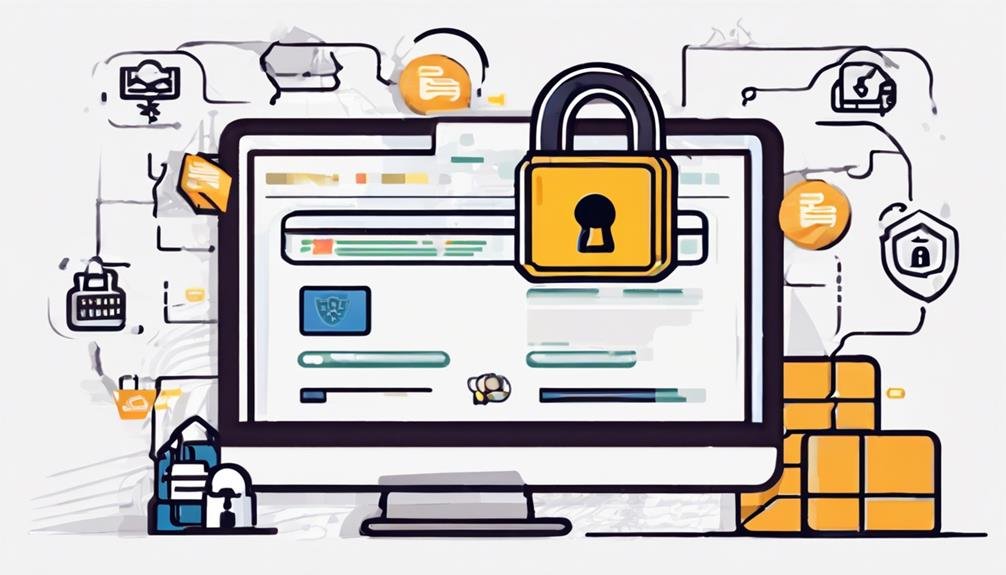Table of Contents
Key Takeaways of Customer Privacy With Bitcoin Transactions
- Implement secure payment gateways with encryption to protect customer data.
- Utilize blockchain technology for transparent and tamper-proof transactions.
- Enhance data encryption measures like SSL/TLS to ensure privacy during e-commerce.
- Balance innovation and security to maintain customer trust and experience.
In the ever-evolving landscape of e-commerce, safeguarding customer privacy is paramount for businesses looking to establish trust and credibility. By implementing robust measures such as secure payment gateways, leveraging cutting-edge blockchain technology, and enhancing data encryption protocols, companies can fortify their defenses against potential data breaches and cyber threats. These strategies offer a glimpse into the proactive steps taken by industry leaders and highlight the intricate balance between innovation and security in the digital marketplace.
Implementing Secure Payment Gateways

The implementation of robust and secure payment gateways is a fundamental aspect of ensuring customer privacy and data protection in e-commerce. Secure payment gateways are vital in safeguarding sensitive customer information by utilizing encryption to secure online transactions. By employing secure payment gateways that comply with PCI DSS standards, businesses can prevent unauthorized access to financial details and personal data during online payments.
Moreover, using secure payment gateways not only helps in fraud prevention but also greatly reduces the risk of data breaches, enhancing the overall security of e-commerce transactions. This proactive approach protects customers and builds trust between e-commerce businesses and their clientele. Ultimately, implementing secure payment gateways is essential for establishing a safe and reliable online payment environment, ensuring the confidentiality and integrity of customer financial information.
Utilizing Blockchain Technology
Blockchain technology revolutionizes the landscape of e-commerce by providing a secure and transparent framework for transactions and data management. In e-commerce, customer data is highly sensitive, and blockchain guarantees its protection through decentralized networks that offer tamper-proof storage. Smart contracts, a feature of blockchain, play an essential role in automating and securing agreements related to customer privacy, thereby enhancing security measures. The immutable ledgers in blockchain technology further safeguard customer information by preventing unauthorized access and guaranteeing data integrity.
Enhancing Data Encryption Measures

Building upon the foundation of secure blockchain technology in e-commerce, the focus now shifts towards fortifying customer privacy by implementing robust data encryption measures. To enhance data encryption in e-commerce and protect sensitive customer information, consider the following:
- Implement Strong Encryption: Utilize encryption technology such as SSL or TLS to effectively secure data at rest and in transit.
- Encrypt Sensitive Data: Safeguard payment details and personal information with encryption to prevent unauthorized access and data breaches.
- Secure Data Transmission: Confirm that all data exchanges between systems are encrypted to maintain customer privacy and data security.
- Utilize Encryption Software: Employ encryption solutions to protect data integrity and customer information during e-commerce transactions.
Frequently Asked Questions
How Can E-commerce Protect Privacy?
To protect privacy in e-commerce, robust measures like data encryption, secure transactions, privacy policies, user authentication, secure passwords, two-factor authentication, regular audits, privacy settings, data minimization, and secure networks should be implemented to safeguard customer information effectively.
How Do You Protect Customer Privacy?
Protecting customer privacy is paramount in e-commerce. Safeguarding data through encryption, secure passwords, and robust privacy policies is essential. Regular audits, limited access, and user consent guarantee privacy. Employing anonymized data and secure transactions further fortifies customer privacy.
How Should Consumers’ Privacy Be Protected?
Consumer privacy should be protected through robust data encryption, secure authentication methods, strict privacy policies, anonymous browsing options, secure transactions, consent management practices, limited user tracking, data minimization strategies, secure networks, and configurable privacy settings.
What Is the Best Way to Protect Your Privacy Online?
To safeguard privacy online, implement robust privacy tools, utilize advanced encryption methods, prioritize data security measures, mitigate cyber threats, curb online tracking, prevent identity theft, foster customer trust through transparent privacy policies, verify secure transactions, and uphold user anonymity for enhanced protection.
Conclusion
In the domain of e-commerce, safeguarding customer privacy is paramount. By implementing secure payment gateways, utilizing blockchain technology, and enhancing data encryption measures, businesses can build trust and guarantee the protection of sensitive customer data. Picture a fortified fortress with impenetrable walls and intricate security systems, safeguarding valuable treasures from potential threats. As this fortress protects its riches, businesses must diligently protect customer privacy to maintain their reputation and foster trust among their clientele.



